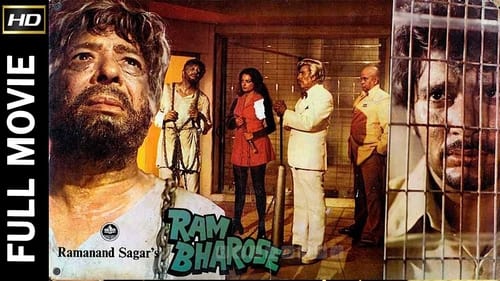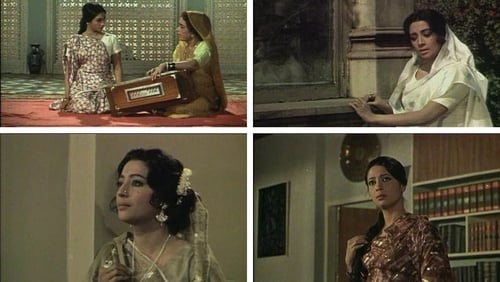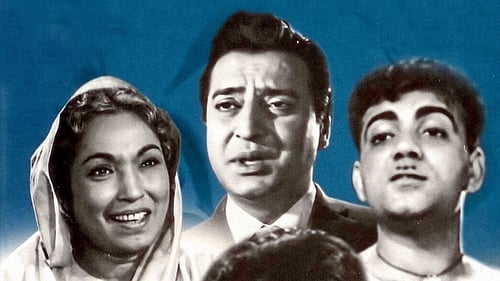
Story
Set during one of India’s main peasant risings, the Telangana insurrection between 1945 and 1951 in the pre-Independence state of Hyderabad, the Bengali director’s first feature tells the story of Chander’s best-known novel (Jab Khet Jaage (1948)) from the peasant’s point of view. A young peasant, Ramiah, rebels against the corrupt rule of the nizam, and when his girlfriend has to submit to the potentate’s sexual coercion, Ramiah leaves. He befriends a Marxist activist (the rising was CPI-inspired) and participates in the Independence struggle.

Dialogue
Refusing to follow his corrupt brother's bad example, a sincere, honest but buffoonish police cadet helps to rout a gang of organised criminals who are involved in treachery, kidnapping and murder.

Dialogue
The Bombay police is baffled at a series of robberies being committed in homes of prominent people, with the thief leaving a swastika and stealing only one set of jewellery instead of everything in the safe. Their investigation takes them to bring in a notorious burglar, Tony, who denies having anything to do with these robberies.

Dialogue
A man takes in his daughter's fiance only to learn that he has been frequenting a prostitute under the auspices of teaching her to read and write.

Dialogue
The son of a wealthy family, Monish falls in love with Deviyani, a girl from a considerably less privileged background. When Monish leaves to study abroad, the lovers plan to reunite, but desperate financial straits force Deviyani into a marriage with a philandering drunk instead. Deeply unhappy, she flees, taking her infant daughter with her and vanishing into thin air. Does fate have more than misery in store for the unfortunate Deviyani?

Dialogue
Seema lives a wealthy lifestyle with her widowed mom in Bombay, India. Her mother is a compassionate soul who rents out several rooms in a self-owned building, which is occupied by very poor and nearly destitute people. Seema's mom often ends up looking after her tenants financially and also gives them ample time to find money to pay the rent. Seema, who wants a luxurious lifestyle, has sold the building to Bihari, and is all set to evict the tenants forcibly. Watch what happens when Seema's mother and Rajan decide to confront her to try and stop this sale.

Screenplay
Seema lives a wealthy lifestyle with her widowed mom in Bombay, India. Her mother is a compassionate soul who rents out several rooms in a self-owned building, which is occupied by very poor and nearly destitute people. Seema's mom often ends up looking after her tenants financially and also gives them ample time to find money to pay the rent. Seema, who wants a luxurious lifestyle, has sold the building to Bihari, and is all set to evict the tenants forcibly. Watch what happens when Seema's mother and Rajan decide to confront her to try and stop this sale.

Dialogue
Hindi film from 1960

Dialogue
The orphaned Poornima is consigned to the care of her grandfather by her uncaring aunt. Grandfather lives in isolation up a mountain with only goats and the boy goatherd, Jaggu, for company. Poornima enjoys an idyllic life until her aunt returns. Auntie has found a buyer for her niece. She is to become the companion of the wheelchair bound, Rupa. Forced to leave her mountain retreat, Poornima becomes firm friends with Rupa despite the presence of the scowling nanny. She receives a good education too. Even so, Poornima pines for the mountains. Jaggu pines for Poornima and, when on the doctor's advice, Poornima is returned to the hills, it's Rupa's turn to pine for her. Brought up the mountain for a visit, Rupa enjoys the health-giving properties of fresh air and goats' milk. When her wheelchair is tossed over a cliff by Jaggu (who resents the presence of the interloper)a miracle occurs. The story is adapted from the children's classic "Heidi".

Writer
A group of freedom-fighters face betrayal and go on the run from police in British-occupied Hindustan.

Screenplay
A stridently nationalistic story of India’s freedom struggle, presented through the experiences of a Bengali family from 1885, when the Indian National Congress was established, to 1947. Important events incorporated into the plot were Gandhi’s satyagraha (1920), the Simon Commission (1928), Vallabhbhai Patel’s Bardoli satyagraha (1928) and the 1942 Quit India agitations. Krishan Chander’s script, Sachin Shankar’s choreography and the acting styles owed much to the IPTA theatre of the 40s. The film, made at Bombay Talkies, was produced by the distributors of the Chicago Radio PA systems label. Kishore Kumar plays the militant hero of this quasi-documentary. Motwane included old documentary footage purchased from Kohinoor and Krishna Film, as well as a shot of Rabindranath Tagore singing his Jana Gana Mana composition, one of India’s national anthems (Arunkumar Roy’s Of Tagore and Cinema, 1994, traces this footage to Ufa, shot when Tagore visited Munich)

Story
Based on plays by Bhattacharya and the story Annadata by Krishan Chander









